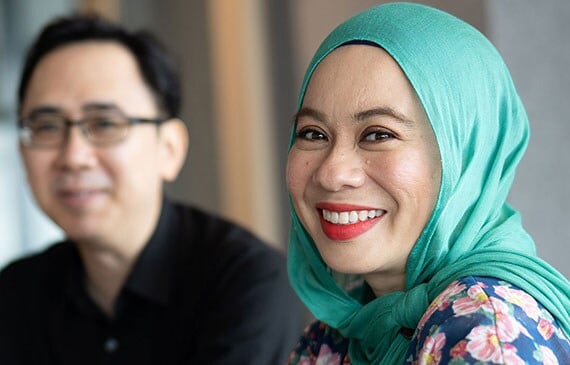Fostering a collaborative and performance-driven workplace
We are proud of the global reach of our company, which operates in approximately 170 markets with more than 80,000 employees representing 130-plus nationalities. We reflect the demographics of the countries, communities, and consumers we serve, which is key to the combination of thought, innovation, and consumer-centric approach that will enable us to deliver a smoke-free future.
Our focus is on fostering a performance-driven, diverse, and collaborative culture, recognizing the value of each individual in our global workforce and their contributions. We remain committed to the impact, growth, and wellbeing of our employees, providing them with the right environment, support, and resources for their careers and professional development. These principles are codified in our cultural values, which we refer to as the PMI DNA.
A culture of togetherness and belonging
At PMI, collaboration is about cultivating a culture where different perspectives are valued, open dialogue is encouraged, and every individual feels empowered to contribute. Our PMI DNA—We Care, We are Better Together, We are Game Changers—defines how we work, lead, and engage with each other every day. These values serve as a guiding framework that was developed through deep reflection and employee input, ensuring they resonate with the experiences and aspirations of our global workforce.
Collaboration thrives when people feel heard, respected, valued, and supported. That is why we are committed to fostering an environment of psychological safety, trust, and accountability. We Care means listening with empathy, being mindful of the impact of our words and actions, and supporting each other. We are Better Together emphasizes the power of our global teams, encouraging open and honest conversations that drive innovation. And We are Game Changers challenges us to continuously evolve, learn, and push boundaries, ensuring that PMI remains a dynamic and forward-thinking organization.
By living the PMI DNA, we unlock our collective potential, creating a culture where everyone can thrive, contribute, and drive meaningful impact. Together, we are building a workplace that is not only high-performing but also deeply collaborative—one where every voice matters and every action helps shape a better future.
We Care
Self-aware
Inclusive
Empathetic
We are Better Together
Trust
Collaborate
Celebrate
We are Game Changers
Embrace challenge
Agile
Drive for impact
A culture of growth
For us, growth is about continuously evolving, learning, and unlocking potential every day. It is woven into the fabric of our culture, reflected in the PMI DNA, and embedded in how we support our people. Whether through skill-building, career development, or meaningful feedback, we are committed to providing the tools and opportunities that empower employees to co-create their own path. Growth is a shared responsibility and, at PMI, we create it together.
Employees are encouraged to take ownership of their growth by reflecting on where they are, where they want to be, and how to get there. PMI supports this journey through structured career conversations, cross-functional mobility, and a wealth of learning resources, from on-the-job experiences to specialized programs designed to expand knowledge, skills, and business understanding. Open and honest feedback is key to this process, helping individuals build self-awareness, adapt, and continually improve.
By fostering a culture that values curiosity, resilience, and continuous learning, we are strengthening both our people and our business. The more we grow—individually and collectively—the more we can drive impact and shape the future.
Focus on wellbeing
At PMI, we believe that wellbeing is essential to both personal fulfillment and professional success. That is why we have made it a strategic priority, ensuring that our people have the environment, support, and resources to thrive. Our approach to wellbeing goes beyond work-life balance—it is about true integration, enabling everyone to manage their journeys while also prioritizing their physical, mental, and emotional health. By fostering a workplace where wellbeing is valued, we empower our people to perform at their best, innovate with confidence, and find meaning in their work.
We take a holistic approach, recognizing that wellbeing is shaped by physical health, psychological safety, and opportunities for personal growth. Programs like our Wellbeing Champions Network help normalize conversations around mental health, while our Employee Assistance Program (EAP) ensures support is always available. Tools like Microsoft Viva Insights promote healthier work habits, and our Global Annual Leave guidelines encourage employees to truly disconnect and recharge. Additionally, our Smart Work approach enables greater flexibility, supporting employees in integrating work with their personal lives in a way that enhances both productivity and fulfillment.
Beyond individual wellbeing, we are committed to fostering a sense of purpose and connection. Initiatives like Projects with a Heart provide employees with opportunities to give back to their communities, reinforcing the idea that fulfillment comes not only from career growth but also from making a meaningful impact. By continuously evolving our approach based on employee feedback, we ensure that PMI remains a place where people feel supported, valued, and inspired—both in their work and in their lives.





